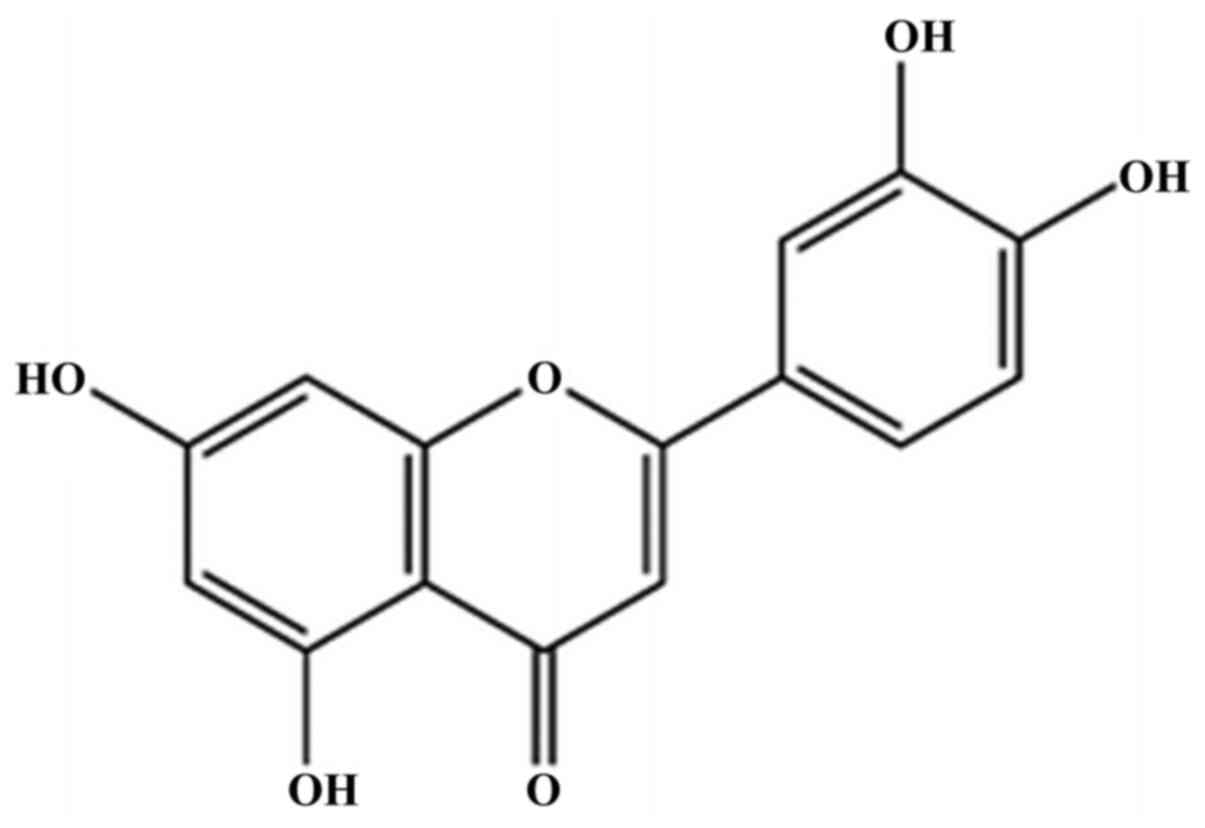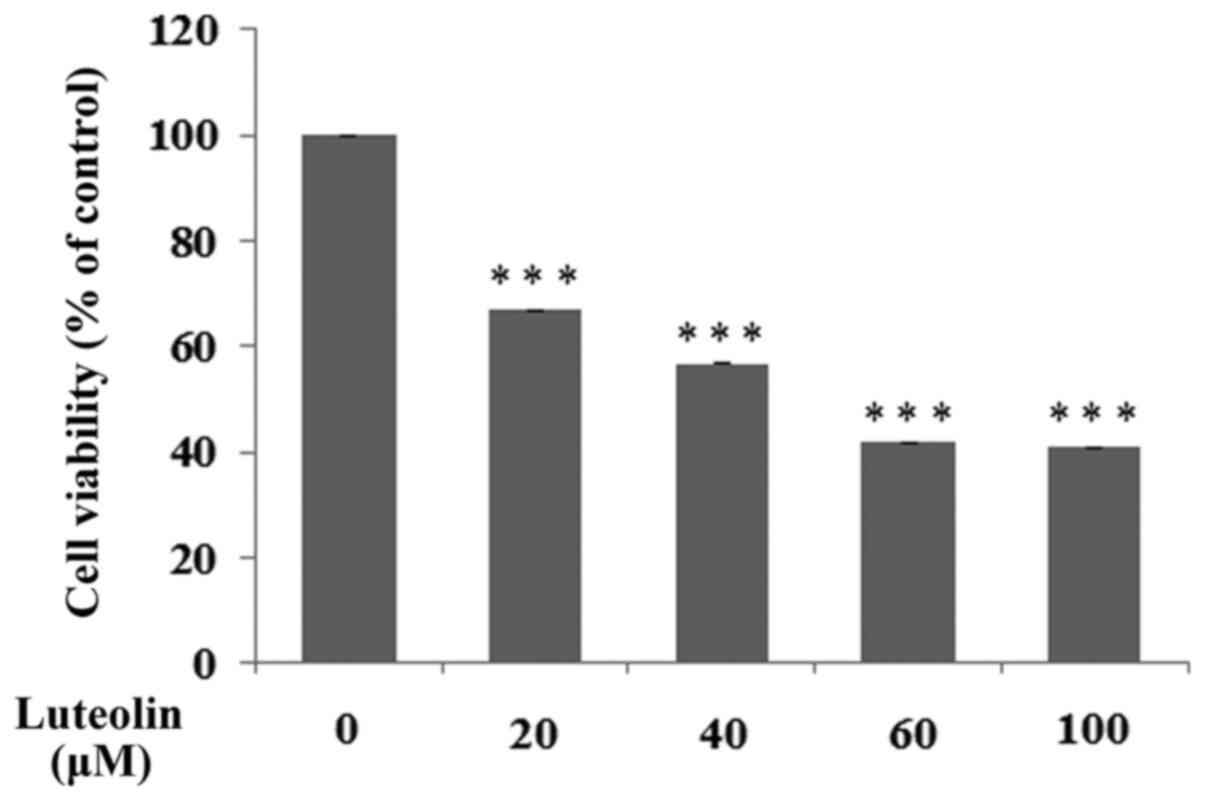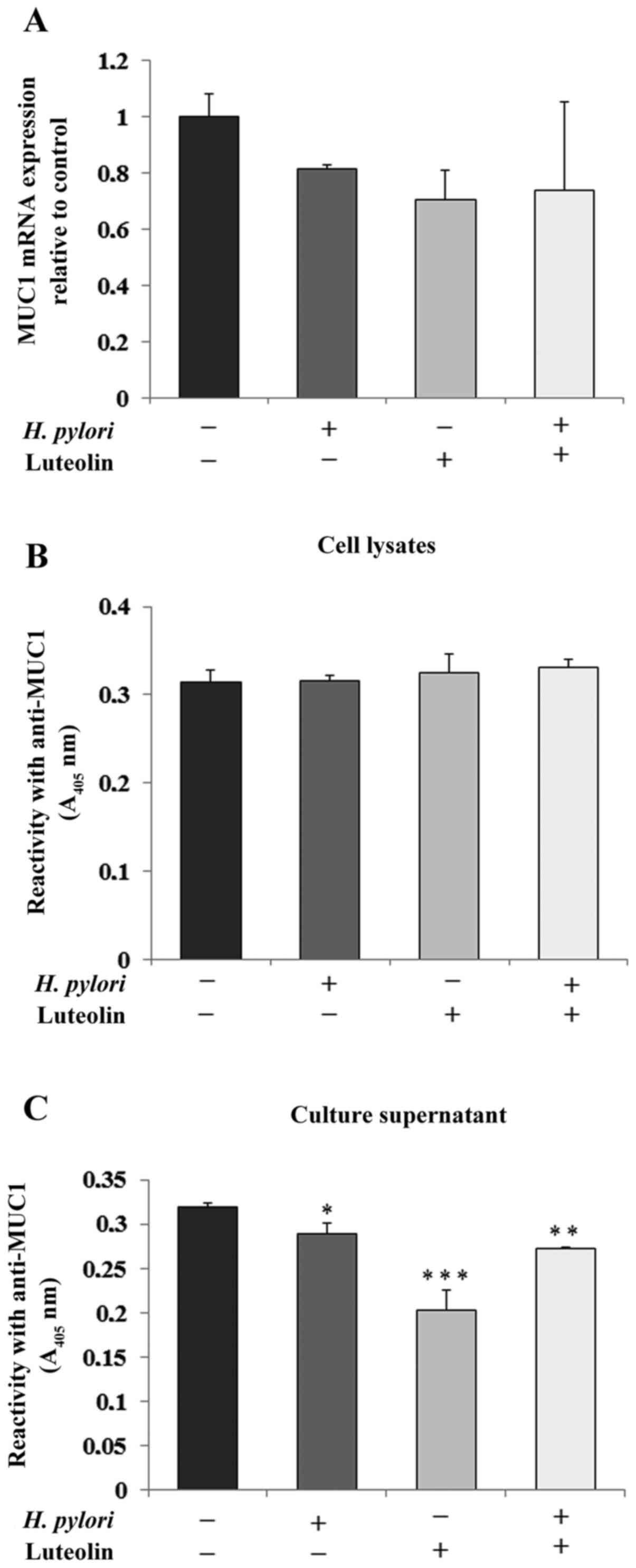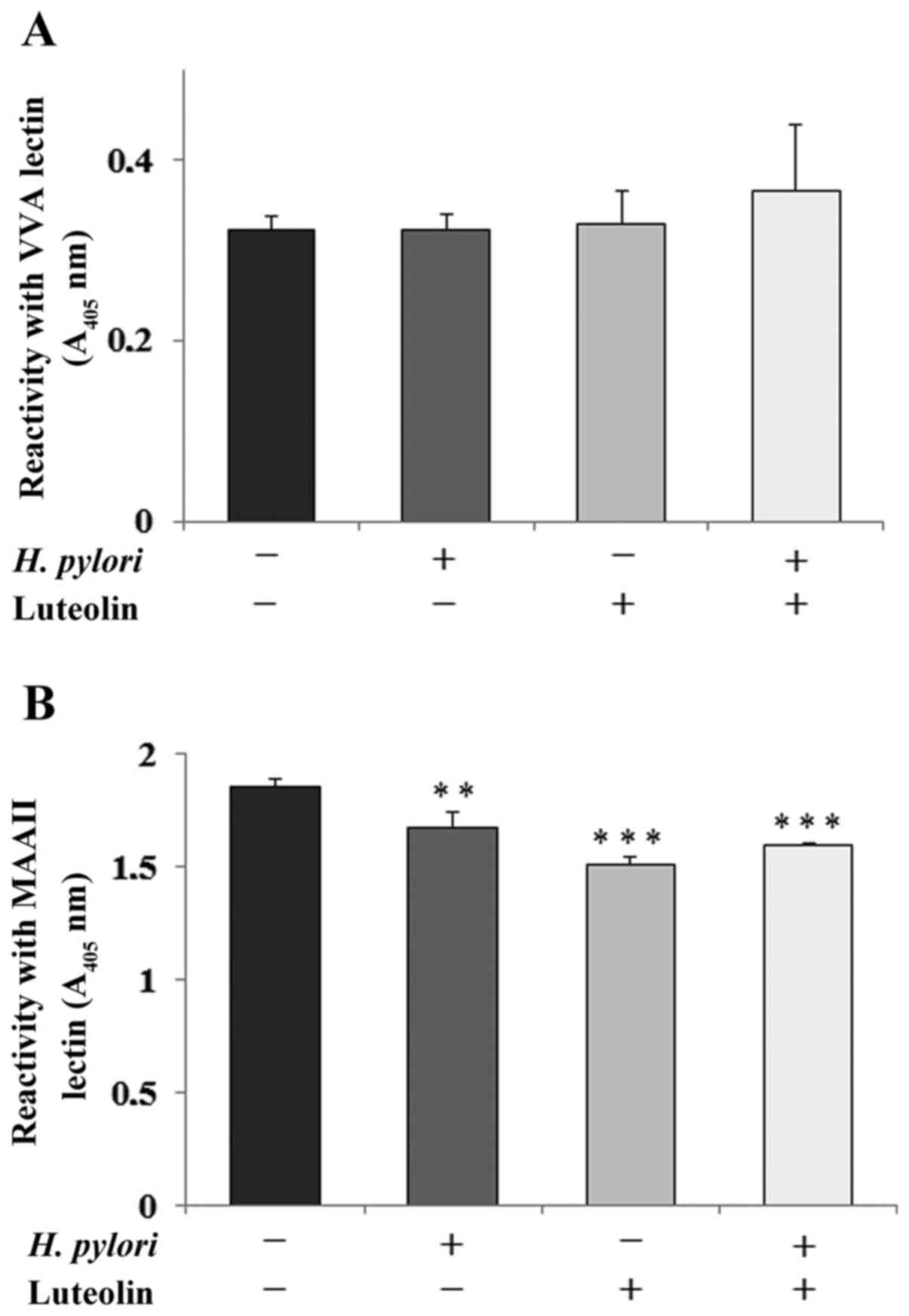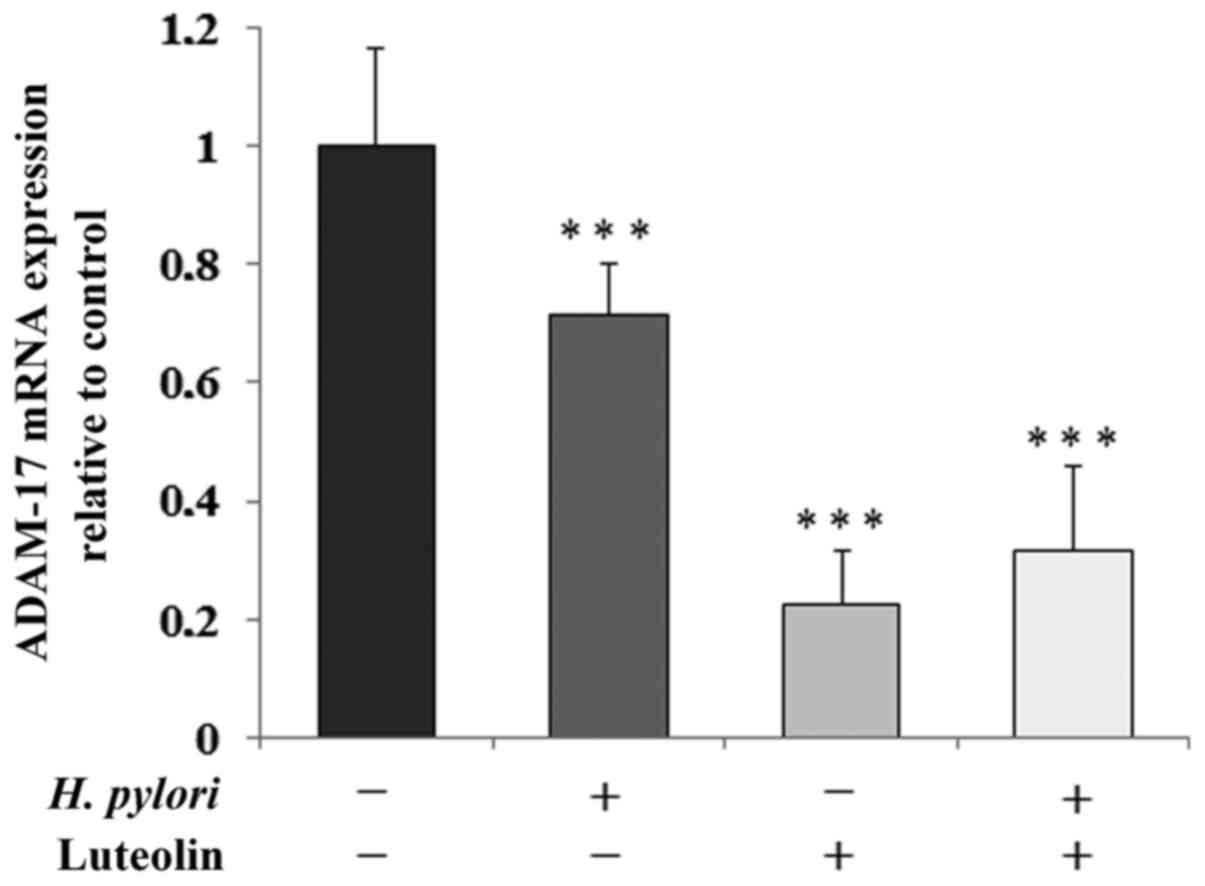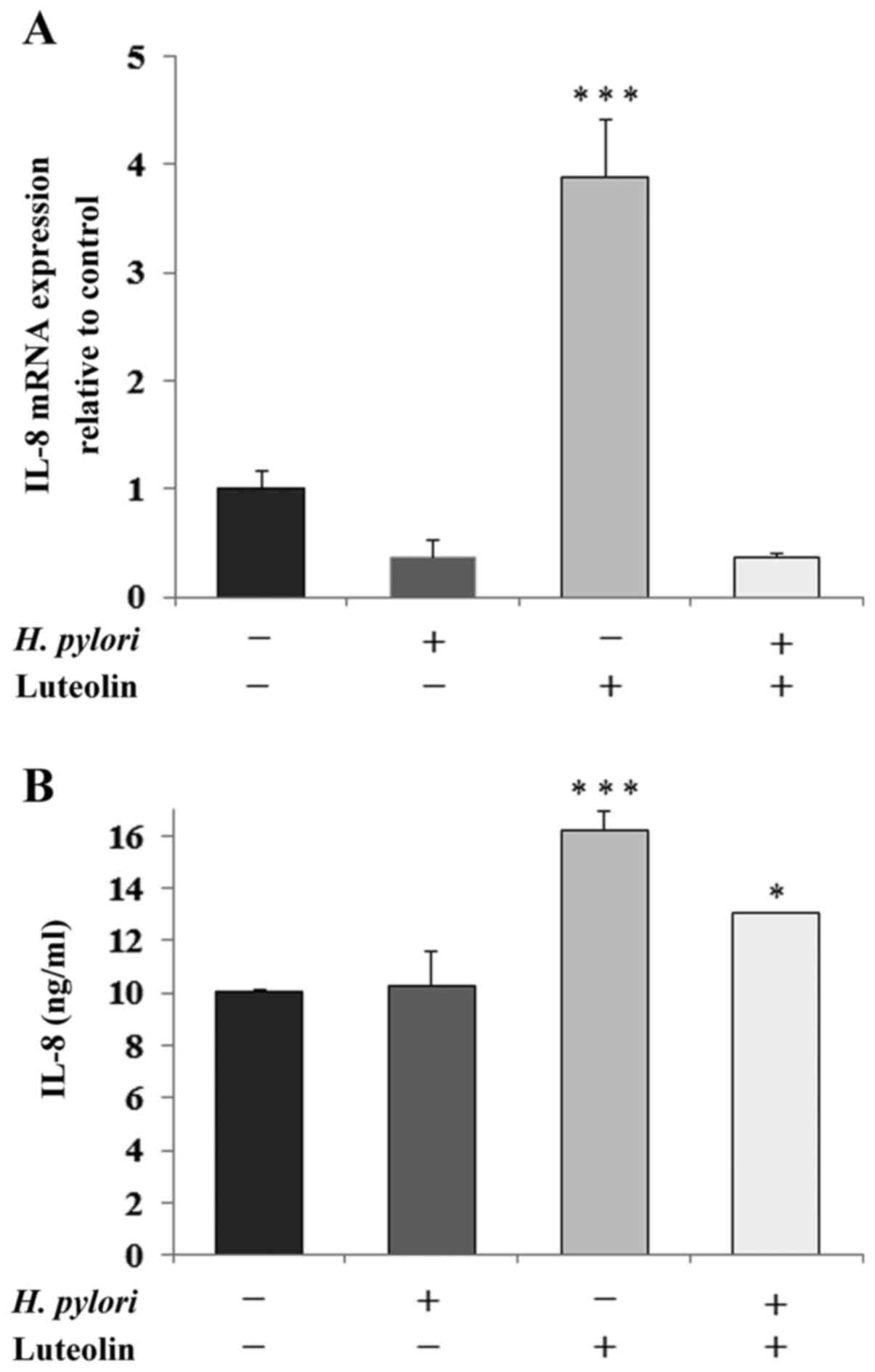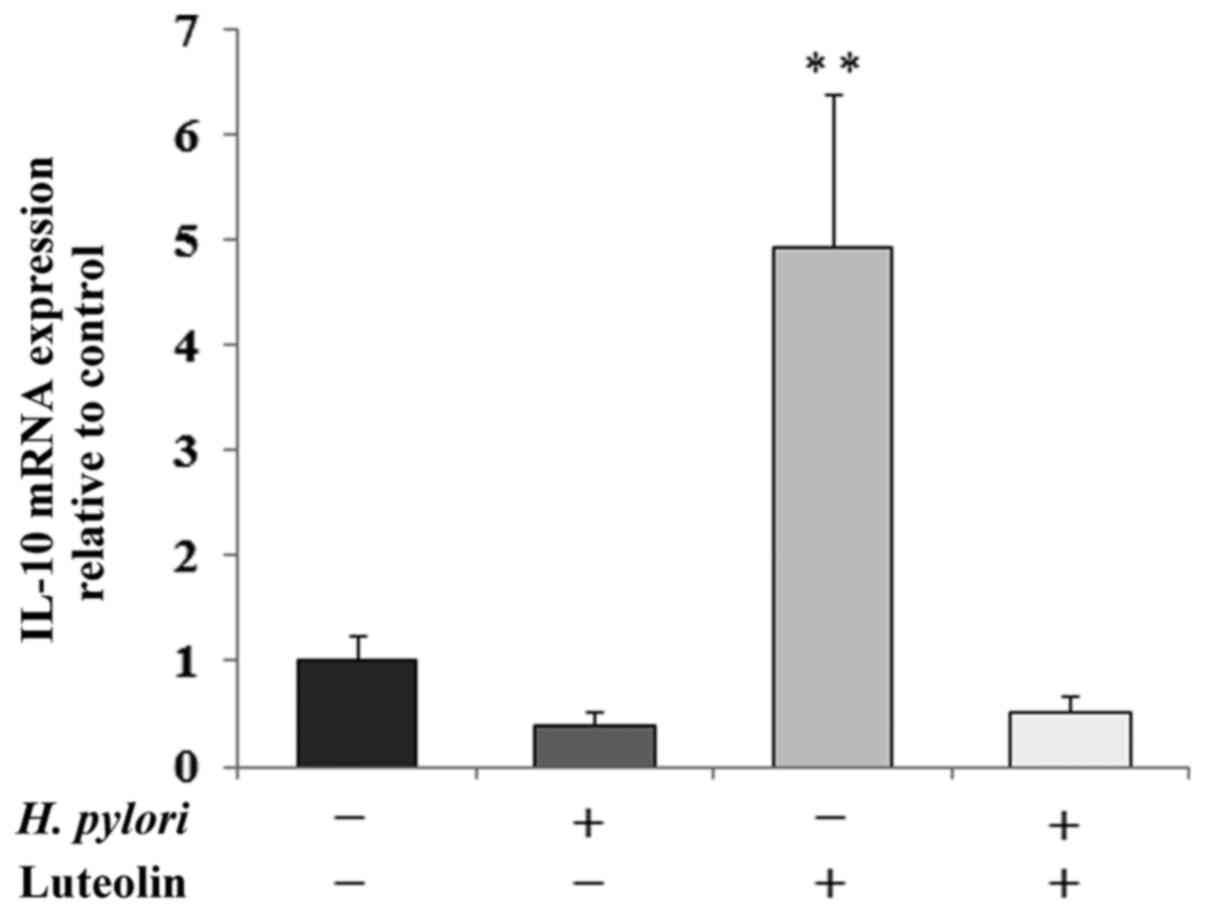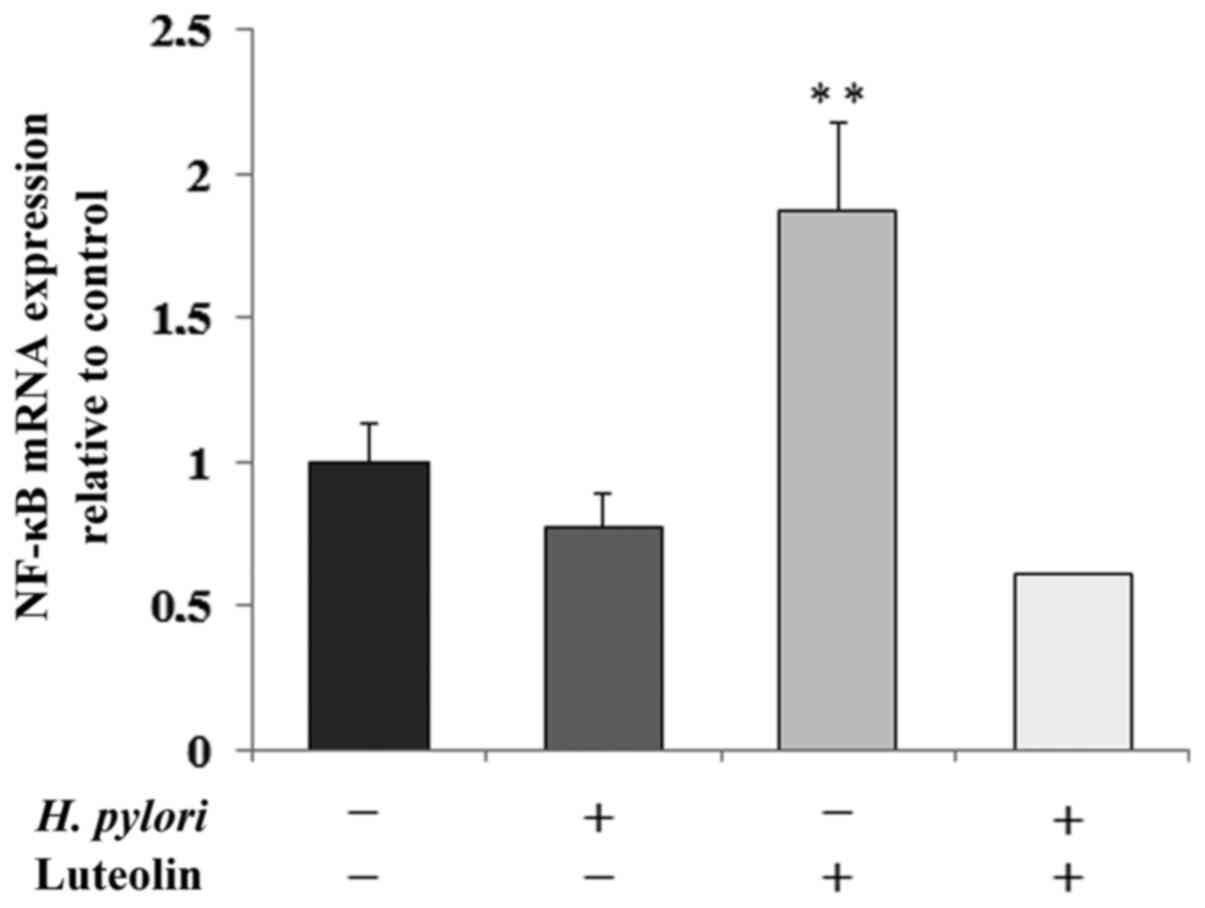|
1
|
Xiong J, Li S, Wang W, Hong Y, Tang K and
Luo Q: Screening and identification of the antibacterial bioactive
compounds from Lonicera japonica Thunb. leaves. Food Chem.
138:327–333. 2013.PubMed/NCBI View Article : Google Scholar
|
|
2
|
López-Lázaro M: Distribution and
biological activities of the flavonoid luteolin. Mini Rev Med Chem.
9:31–59. 2009.PubMed/NCBI View Article : Google Scholar
|
|
3
|
Birt DF, Hendrich S and Wang W: Dietary
agents in cancer prevention: Flavonoids and isoflavonoids.
Pharmacol Ther. 90:157–177. 2001.PubMed/NCBI View Article : Google Scholar
|
|
4
|
Lin Y, Shi R, Wang X and Shen HM:
Luteolin, a flavonoid with potential for cancer prevention and
therapy. Curr Cancer Drug Targets. 8:634–646. 2008.PubMed/NCBI View Article : Google Scholar
|
|
5
|
Nepali S, Son JS, Poudel B, Lee JH, Lee YM
and Kim DK: Luteolin is a bioflavonoid that attenuates
adipocyte-derived inflammatory responses via suppression of nuclear
factor-κB/mitogen-activated protein kinases pathway. Pharmacogn
Mag. 11:627–635. 2015.PubMed/NCBI View Article : Google Scholar
|
|
6
|
Johnson JL and Gonzalez de Mejia E:
Interactions between dietary flavonoids apigenin or luteolin and
chemotherapeutic drugs to potentiate anti-proliferative effect on
human pancreatic cancer cells, in vitro. Food Chem Toxicol.
60:83–91. 2013.PubMed/NCBI View Article : Google Scholar
|
|
7
|
Siegel R, Ma J, Zou Z and Jemal A: Cancer
statistics, 2014. CA Cancer J Clin. 64:9–29. 2014.PubMed/NCBI View Article : Google Scholar
|
|
8
|
Amieva M and Peek RM Jr: Pathobiology of
Helicobacter pylori -induced gastric cancer.
Gastroenterology. 150:64–78. 2016.PubMed/NCBI View Article : Google Scholar
|
|
9
|
Ang TL and Fock KM: Clinical epidemiology
of gastric cancer. Singapore Med J. 55:621–628. 2014.PubMed/NCBI View Article : Google Scholar
|
|
10
|
Christiansen MN, Chik J, Lee L, Anugraham
M, Abrahams JL and Packer NH: Cell surface protein glycosylation in
cancer. Proteomics. 14:525–546. 2014.PubMed/NCBI View Article : Google Scholar
|
|
11
|
Cascio S and Finn OJ: Intra- and
extra-cellular events related to altered glycosylation of MUC1
promote chronic inflammation, tumor progression, innovation and
metastasis. Biomolecules. 6(E39)2016.PubMed/NCBI View Article : Google Scholar
|
|
12
|
Hollingsworth MA and Swanson BJ: Mucins in
cancer: Protection and control of the cell surface. Nat Rev Cancer.
4:45–60. 2004.PubMed/NCBI View
Article : Google Scholar
|
|
13
|
Mukhopadhyay P, Chakraborty S, Ponnusamy
MP, Lakshmanan I, Jain M and Batra SK: Mucins in the pathogenesis
of breast cancer: Implications in diagnosis, prognosis and therapy.
Biochim Biophys Acta. 1815:224–240. 2011.PubMed/NCBI View Article : Google Scholar
|
|
14
|
Thathiah A, Blobel CP and Carson DD: Tumor
necrosis factor-α converting enzyme/ADAM 17 mediates MUC1 shedding.
J Biol Chem. 278:3386–3394. 2003.PubMed/NCBI View Article : Google Scholar
|
|
15
|
Goth CK, Halim A, Khetarpal SA, Rader DJ,
Clausen H and Schjoldager KT: A systematic study of modulation of
ADAM-mediated ectodomain shedding by site-specific O-glycosylation.
Proc Natl Acad Sci USA. 112:14623–14628. 2015.PubMed/NCBI View Article : Google Scholar
|
|
16
|
Fu C, Zhao H, Wang Y, Cai H, Xiao Y, Zeng
Y and Chen H: Tumor-associated antigens: Tn antigen, sTn antigen,
and T antigen. HLA. 88:275–286. 2016.PubMed/NCBI View Article : Google Scholar
|
|
17
|
Lillehoj EP, Guang W, Ding H, Czinn SJ and
Blanchard TG: Helicobacter pylori and gastric inflammation:
Role of MUC1 mucin. J Pediatr Biochem. 2:125–132. 2012.PubMed/NCBI View Article : Google Scholar
|
|
18
|
Wang F, Meng W, Wang B and Qiao L:
Helicobacter pylori-induced gastric inflammation and gastric
cancer. Cancer Lett. 345:196–202. 2014.PubMed/NCBI View Article : Google Scholar
|
|
19
|
Lee KE, Khoi PN, Xia Y, Park JS, Joo YE,
Kim KK, Choi SY and Jung YD: Helicobacter pylori and
interleukin-8 in gastric cancer. World J Gastroenterol.
19:8192–8202. 2013.PubMed/NCBI View Article : Google Scholar
|
|
20
|
Ahmad N, Ammar A, Storr SJ, Green AR,
Rakha E, Ellis IO and Martin SG: IL-6 and IL-10 are associated with
good prognosis in early stage invasive breast cancer patients.
Cancer Immunol Immunother. 67:537–549. 2018.PubMed/NCBI View Article : Google Scholar
|
|
21
|
Fasoulakis Z, Kolios G, Papamanolis V and
Kontomanolis EN: Interleukins associated with breast cancer.
Cureus. 10(e.3549)2018.PubMed/NCBI View Article : Google Scholar
|
|
22
|
Puri KS, Suresh KR, Gogtay NJ and Thatte
UM: Declaration of Helsinki, 2008: Implications for stakeholders in
research. J Postgrad Med. 55:131–134. 2009.PubMed/NCBI View Article : Google Scholar
|
|
23
|
Beveridge TJ: Use of the gram stain in
microbiology. Biotech Histochem. 76:111–118. 2001.PubMed/NCBI
|
|
24
|
Uotani T and Graham DY: Diagnosis of
Helicobacter pylori using the rapid urease test. Ann Transl
Med. 3:9–7. 2015.PubMed/NCBI View Article : Google Scholar
|
|
25
|
Bai Y, Zhang YL, Jin JF, Wang JD, Zhang ZS
and Zhou DY: Recombinant Helicobacter pylori catalase. World
J Gastroenterol. 9:1119–1122. 2003.PubMed/NCBI View Article : Google Scholar
|
|
26
|
Carmichael J, DeGraff WG, Gazdar AF, Minna
JD and Mitchell JB: Evaluation of a tetrazolium-based semiautomated
colorimetric assay: Assessment of chemosensitivity testing. Cancer
Res. 47:936–942. 1987.PubMed/NCBI
|
|
27
|
Puri KD, Gopalakrishnan B and Surolia A:
Carbohydrate binding specificity of the Tn-antigen binding lectin
from Vicia villosa seeds (VVLB4). FEBS Lett. 312:208–212.
1992.PubMed/NCBI View Article : Google Scholar
|
|
28
|
Redelinghuys P, Antonopoulos A, Liu Y,
Campanero-Rhodes MA, McKenzie E, Haslam SM, Dell A, Feizi T and
Crocker PR: Early murine T-lymphocyte activation is accompanied by
a switch from N-Glycolyl- to N-acetyl-neuraminic acid and
generation of ligands for siglec-E. J Biol Chem. 286:34522–34532.
2011.PubMed/NCBI View Article : Google Scholar
|
|
29
|
Livak KJ and Schmittgen TD: Analysis of
relative gene expression data using real-time quantitative PCR and
the 2-ΔΔCT method. Methods. 25:402–408. 2001.PubMed/NCBI View Article : Google Scholar
|
|
30
|
Zong L, Abe M, Seto Y and Ji J: The
challenge of screening for early gastric cancer in China. Lancet.
388(2606)2016.PubMed/NCBI View Article : Google Scholar
|
|
31
|
Cervantes A, Roda D, Tarazona N, Roselló S
and Pérez-Fidalgo JA: Current questions for the treatment of
advanced gastric cancer. Cancer Treat Rev. 39:60–67.
2013.PubMed/NCBI View Article : Google Scholar
|
|
32
|
Wang X, Ouyang Y, Liu J, Zhu M, Zhao G,
Bao W and Hu FB: Fruit and vegetable consumption and mortality from
all causes, cardiovascular disease, and cancer: Systematic review
and dose-response meta-analysis of prospective cohort studies. BMJ.
349(g4490)2014.PubMed/NCBI View Article : Google Scholar
|
|
33
|
Ranjan A, Ramachandran S, Gupta N, Kaushik
I, Wright S, Srivastava S, Das H, Srivastava S, Prasad S and
Srivastava SK: Role of phytochemicals in cancer prevention. Int J
Mol Sci. 20(4981)2019.PubMed/NCBI View Article : Google Scholar
|
|
34
|
Chikara S, Nagaprashantha LD, Singhal J,
Horne D, Awasthi S and Singhal SS: Oxidative stress and dietary
phytochemicals: Role in cancer chemoprevention and treatment.
Cancer Lett. 413:122–134. 2018.PubMed/NCBI View Article : Google Scholar
|
|
35
|
Ma L, Peng H, Li K, Zhao R, Li L, Yu Y,
Wang X and Han Z: Luteolin exerts an anticancer effect on NCI-H460
human non-small cell lung cancer cells through the induction of
Sirt1-mediated apoptosis. Mol Med Rep. 12:4196–4202.
2015.PubMed/NCBI View Article : Google Scholar
|
|
36
|
Pu Y, Zhang T, Wang J, Mao Z, Duan B, Long
Y, Xue F, Liu D, Liu S and Gao Z: Luteolin exerts an anticancer
effect on gastric cancer cells through multiple signaling pathways
and regulating miRNAs. J Cancer. 9:3669–3675. 2018.PubMed/NCBI View Article : Google Scholar
|
|
37
|
Zang MD, Hu L, Fan ZY, Wang HX, Zhu ZL,
Cao S, Wu XY, Li JF, Su LP, Li C, et al: Luteolin suppresses
gastric cancer progression by reversing epithelial-mesenchymal
transition via suppression of the Notch signaling pathway. J Transl
Med. 15(52)2017.PubMed/NCBI View Article : Google Scholar
|
|
38
|
Bhatia R, Gautam SK, Cannon A, Thompson C,
Hall BR, Aithal A, Banerjee K, Jain M, Solheim JC, Kumar S, et al:
Cancer-associated mucins: Role in immune modulation and metastasis.
Cancer Metastasis Rev. 38:223–236. 2019.PubMed/NCBI View Article : Google Scholar
|
|
39
|
Raina D, Kharbanda S and Kufe D: The MUC1
oncoprotein activates the anti-apoptotic phosphoinositide
3-kinase/Akt and Bcl-xL pathways in rat 3Y1 fibroblasts. J Biol
Chem. 279:20607–20612. 2004.PubMed/NCBI View Article : Google Scholar
|
|
40
|
Raina D, Ahmad R, Kumar S, Ren J, Yoshida
K, Kharbanda S and Kufe D: MUC1 oncoprotein blocks nuclear
targeting of c-Abl in the apoptotic response to DNA damage. EMBO J.
25:3774–3783. 2006.PubMed/NCBI View Article : Google Scholar
|
|
41
|
Agata N, Ahmad R, Kawano T, Raina D,
Kharbanda S and Kufe D: MUC1 oncoprotein blocks death
receptor-mediated apoptosis by inhibiting recruitment of caspase-8.
Cancer Res. 68:6136–6144. 2008.PubMed/NCBI View Article : Google Scholar
|
|
42
|
Rahn JJ, Chow JW, Horne GJ, Mah BK,
Emerman JT, Hoffman P and Hugh JC: MUC1 mediates transendothelial
migration in vitro by ligating endothelial cell ICAM-1. Clin Exp
Metastasis. 22:475–483. 2005.PubMed/NCBI View Article : Google Scholar
|
|
43
|
Lindén SK, Sheng YH, Every AL, Miles KM,
Skoog EC, Florin TH, Sutton P and McGuckin MA: MUC1 limits
Helicobacter pylori infection both by steric hindrance and
by acting as a releasable decoy. PLoS Pathog.
5(e1000617)2009.PubMed/NCBI View Article : Google Scholar
|
|
44
|
Murphy G: The ADAMs: Signaling scissors in
the tumour microenvironment. Nat Rev Cancer. 8:929–941.
2008.PubMed/NCBI View Article : Google Scholar
|
|
45
|
Ni SS, Zhang J, Zhao WL, Dong XC and Wang
JL: ADAM17 is overexpressed in non small cell lung cancer and its
expression correlates with poor patient survival. Tumour Biol.
34:1813–1818. 2013.PubMed/NCBI View Article : Google Scholar
|
|
46
|
Zhao J and Tang J: The role of ADAM17 in
tumorigenesis and progression of breast cancer. Tumour Biol.
37:15359–15370. 2016.PubMed/NCBI View Article : Google Scholar
|
|
47
|
Fang W, Qian J, Wu Q, Chen Y and Yu G:
ADAM 17 expression is enhanced by FoxM1 and is a poor prognostic
sign in gastric carcinoma. J Surg Res. 220:223–233. 2017.PubMed/NCBI View Article : Google Scholar
|
|
48
|
Li W, Wang D, Sun X, Zhang Y, Wang L and
Suo J: ADAM17 promotes lymph node metastasis in gastric cancer via
activation of the Notch and Wnt signaling pathways. Int J Mol Med.
43:914–926. 2019.PubMed/NCBI View Article : Google Scholar
|
|
49
|
Santos-Silva F, Fonseca A, Caffrey T,
Carvalho F, Mesquita P, Reis C, Almeida R, David L and
Hollingsworth MA: Thomsen-Friedenreich antigen expression in
gastric carcinomas is associated with MUC1 mucin VNTR polymorphism.
Glycobiology. 15:511–517. 2005.PubMed/NCBI View Article : Google Scholar
|
|
50
|
Yu LG, Andrews N, Zhao Q, McKean D,
Williams JF, Connor LJ, Gerasimenko OV, Hilkens J, Hirabayashi J,
Kasai K, et al: Galectin-3 interaction with Thomsen-Friedenreich
disaccharide on cancer-associated MUC1 causes increased cancer cell
endothelial adhesion. J Biol Chem. 282:773–781. 2007.PubMed/NCBI View Article : Google Scholar
|
|
51
|
Mori Y, Akita K, Yashiro M, Sawada T,
Hirakawa K, Murata T and Nakada H: Binding of galectin-3, a
β-galactoside-binding lectin, to MUC1 protein enhances
phosphorylation of extracellular signal-regulated kinase 1/2
(ERK1/2) and Akt, promoting tumor cell malignancy. J Biol Chem.
290:26125–26140. 2015.PubMed/NCBI View Article : Google Scholar
|
|
52
|
Peek RM Jr, Fiske C and Wilson KT: Role of
innate immunity in Helicobacter pylori-induced gastric
malignancy. Physiol Rev. 90:831–858. 2010.PubMed/NCBI View Article : Google Scholar
|
|
53
|
Yamada S, Kato S, Matsuhisa T,
Makonkawkeyoon L, Yoshida M, Chakrabandhu T, Lertprasertsuk N,
Suttharat P, Chakrabandhu B, Nishiumi S, et al: Predominant mucosal
IL-8 mRNA expression in non-cagA Thais is risk for gastric cancer.
World J Gastroenterol. 19:2941–2949. 2013.PubMed/NCBI View Article : Google Scholar
|
|
54
|
Mumm JB and Oft M: Pegylated IL-10 induces
cancer immunity: The surprising role of IL-10 as a potent inducer
of IFN-γ-mediated CD8(+) T cell cytotoxicity. Bioessays.
35:623–631. 2013.PubMed/NCBI View Article : Google Scholar
|
|
55
|
Kim JA, Kim DK, Kang OH, Choi YA, Park HJ,
Choi SC, Kim TH, Yun KJ, Nah YH and Lee YM: Inhibitory effect of
luteolin on TNF-alpha-induced IL-8 production in human colon
epithelial cells. Int Immunopharmacol. 5:209–217. 2005.PubMed/NCBI View Article : Google Scholar
|
|
56
|
Nunes C, Almeida L, Barbosa RM and
Laranjinha J: Luteolin suppresses the JAK/STAT pathway in a
cellular model of intestinal inflammation. Food Funct. 8:387–396.
2017.PubMed/NCBI View Article : Google Scholar
|
|
57
|
Lee YJ, Lim T, Han MS, Lee SH, Baek SH,
Nan HY and Lee C: Anticancer effect of luteolin is mediated by
downregulation of TAM receptor tyrosine kinases, but not
interleukin-8, in non-small cell lung cancer cells. Oncol Rep.
37:1219–1226. 2017.PubMed/NCBI View Article : Google Scholar
|
|
58
|
Sokolova O and Naumann M: NF-κB signaling
in gastric cancer. Toxins (Basel). 9:1–22. 2017.PubMed/NCBI View Article : Google Scholar
|
|
59
|
Imran M, Rauf A, Abu-Izneid T, Nadeem M,
Shariati MA, Khan IA, Imran A, Orhan IE, Rizwan M, Atif M, et al:
Luteolin, a flavonoid, as an anticancer agent: A review. Biomed
Pharmacother. 112(108612)2019.PubMed/NCBI View Article : Google Scholar
|















